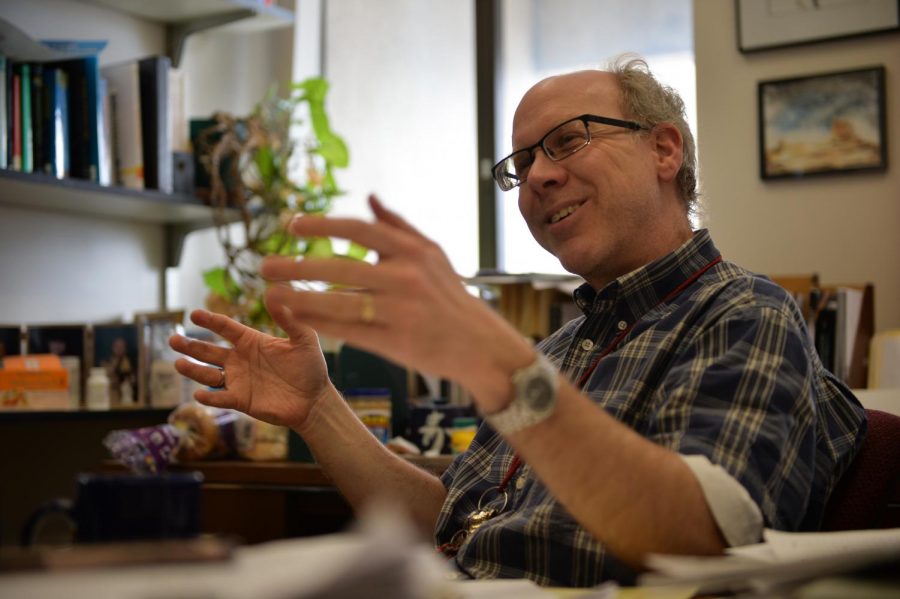Separation of art and STEM affects students
Those studying science miss out on taking art courses; interdisciplinary tracks hold critical thinking benefits
BENJAMIN MICHAELIS | THE DAILY EVERGREEN
Michael Allen, an advisor and instructor in the department of physics and astronomy, discusses student involvement in both science and art on Tuesday, Feb. 26 in Webster Hall. Students rarely double major in the two disciplines, Allen said.
March 7, 2019
As college students, we are focused on learning a specific set of skills to get hired after graduating.
The goal of attending a university is to widen the breadth of opportunities we can achieve in terms of employment while learning how to be an adult along the way. We have been told — overtly or otherwise — what major earns the highest career salary.
Many students follow a linear path to success while ignoring their ambitions in other fields of study. This is where the STEM (science, technology, engineering and math) versus non-STEM issue arises.
“I advise about 60 students, and none of them are studying arts above the UCORE requirements,” said Paul Verrell, a professor and adviser for biological sciences at WSU.
Verrell said that while some of his students are double majoring or minoring on top of their required biological science classes, the courses generally stay within the realm of science.
“It’s very rare to see students double majoring in art and STEM,” said Michael Allen, a senior instructor in the physics and astronomy department. “Physics majors get a minor in math simply because we’ve built it into the program.”
While students have opposing interests in linguistics and fine arts programs, they don’t tend to delve deeper into their passions.
“To quote the popular phrase, nothing kills your interest in something like taking a course in it,” Allen said. “Many students have arts as a hobby — they don’t feel the need to seek out any formal education in it.”
More STEM students are minoring in foreign languages, Norah McCabe, a clinical associate professor and adviser for molecular biosciences at WSU, said.
“More students are becoming interdisciplinary within their majors, but it’s still not all that common,” McCabe said.
The schism between art and science is ever-growing, with students who claim that there is one area of study more important than another. However, by going back far enough in history, there was never any distinction between the two.
“The word ‘science’ didn’t even exist back in the 1800s — people were called natural philosophers,” Verrell said. “There was more sort of a blend of those different ways of knowing that doesn’t exist now in the way it did before. Nowadays, STEM gets all the resources. We are encouraged as advisers to recruit and really push STEM. There’s jobs, money, notoriety in it — and to a certain extent it’s at the expense of other majors.”
UCORE requirements are a way of giving young adults an introduction to other fields of study, but for STEM majors, Verrell said that it is seen as more of a chore — students take other courses because they have to, not because they’re interested in exploring those other avenues.
The main problem may not be lack of interest in other career paths, but rather lack of time. With the cost of attending university in the U.S. at an all-time high, young adults are pressured to figure out what they want to study and then graduate before they have too much debt.
“We have many freshmen come to college [who] want to be STEM majors — not because they’re passionate about the topic but because that’s what they’ve been told to study,” McCabe said. “They’ve been told to get a STEM degree for the money, and that’s sad. The truth is, if you compare salaries from STEM and non-STEM majors just out of college, you will barely see a difference.”
It is important to remember that whatever major you choose to attain, there are endless career avenues for college graduates to pursue.
“As advisers, we are true proponents of telling our students with STEM degrees their options,” McCabe said. “We need to see more young people going into science journalism, policy, law and legislation, geneticists in congress — the bridge between STEM and the general population needs to mend.”
Whatever career path you end up choosing, there are similar traits that hiring managers are looking for, despite what job you are training for.
“It’s very important that students know about transferable skills, those that employers are looking for regardless of major,” Verrell said. “Whether it be philosophy or literature, you have to be as much of a critical thinker as STEM majors. Other majors outside of science give you as many inherent skills as any STEM class, if not more. The trick is to pick up those kinds of skills in whatever you’re doing, as it all is applicable in the process of attaining a job.”
While you can pick up life skills regardless of your major, it is important that you find the right blend between your interests and the educational path you pursue. College is about broadening your horizons and finding what you want to do for the majority of your life.
“We live in a world of increasing specialization and our STEM majors don’t have enough time to take classes, to begin with, so, as a result, I would never advocate that WSU requires more programs to be dedicated into non-STEM courses,” Allen said. “If there were a way to combine art and STEM into the same class to see the crossover between the two, that would be preferred, but taking time away from the specific skill sets that college students are mastering would put our graduates behind the job market curve.”
Allen said that with the changing goals from previous centuries, not everyone has the time to be a “renaissance man.” Because society places importance on certain careers, he said people will choose professions with the highest salaries.
“With that, there are more and less prestigious majors,” Allen said. “Society hasn’t quite adapted to appreciate the value that jobs like teaching have — so we aren’t getting enough high-quality educators to help students in their formative years.”
Allowing and encouraging students to get involved in a variety of fields, not just what they are studying, will be beneficial in a changing society.
“Maybe a generation from now if we were to really show where the arts and sciences connect, that would be in better stead,” Allen said.











Eli Gerbrandt • Mar 12, 2019 at 9:37 am
This article overlooks two things: Incentive and personal interest. STEM majors are tackling difficult degrees, and when they aren’t in the trenches of their homework, they are applying to, and performing internships around the country. There is simply no time in their week to allow for a drawing class, which can drain hours of their time. STEM employers care very little about our arts background, so STEM majors usually don’t bother with anything above UCORE requirements.
This does not mean that STEM students have a narrow education. In our free time, we still make and enjoy art, study philosophy, history, and other fascinating fields, all without needing to take a university class in it. Dr. Allen is right in saying that the students take arts as their hobbies, I am one of them. What incentive do I have to abandon my history books to take a carefully incremented, filtered, postmodern interpreting class covering historical events that I have already learned about?